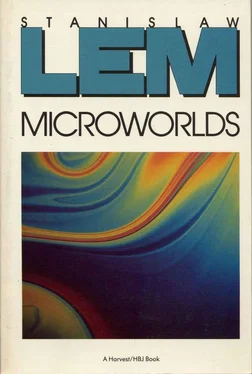Nevertheless, something can be said about my creative method. First, there is no positive correlation between the spontaneity of my writing and the quality of the resulting work. I gave birth to Solaris and Return from the Stars in a similar manner, but I think that Solaris is a good book and Return from the Stars a poor one, because in the latter the underlying problems of social evil and its elimination are treated in a manner that is too primitive, too unlikely, and perhaps even false. (Even if the evil done to others with full intent could be suppressed pharmacologically — the book’s main premise — no chemical or other influence upon the brain could cause the unintended evil effects of all social dependencies, conflicts, and contradictions to disappear from the world, in the same manner that an insecticide can eliminate vermin.) Second, creative spontaneity is not a guarantee that there will be sure development of a whole narrative — i.e., a plot that can be finished without applying force. I have had to put more stories aside unfinished or drop them into the wastebasket than I have been able to submit to publishers. Third, this process of writing, which is characterized by the signs of a creation by trial and error, has always been arrested by blocks and blind alleys that forced me to retreat; sometimes there has even been a “burning out” of the raw materials — the manifold resources necessary for further growth — stored somewhere in my skull. I was not able to finish Solaris for a full year, and could do it then only because I learned suddenly — from myself — how the last chapter had to be. (And then I could only wonder why I hadn’t recognized it from the beginning.) And, fourth, even what I wrote spontaneously never received its final shape in the first thrust of work. I have never written a larger work (it is different with short stories) in a “linear” way right to the end in one sweep; rather, in the pauses between writing sessions — it is for purely physiological reasons impossible to sit at the typewriter all the time — I had new ideas that enriched what was already finished or was to be written soon; changed it; and complicated it with some new turn or complexity of plot.
Practical experience — the result of wrestling with my writing over the years -has taught me never to force what I am working on if it has not ripened at least partly but, rather, to let it rest for some time (which may amount to periods of months, or even years) and let the thing mill around in my head. (A gravid woman knows that an early birth bodes nothing good.) This situation has put me on the horns of a dilemma, however, for, like nearly all writers, I often try to invent excuses for not writing. As is well known, laziness is one of the main barriers hindering everyone in his work. If I waited until I carried something in its definite form around in my head, I would never create anything.
My method of creating (which I should like to call, rather, my behavior as a writer) has changed during the years, if only very slowly. I have learned to avoid the pure spontaneity of beginnings which motivated me to write something even when I had not the slightest idea what would come of the thing — its plot, its problems, its characters, etc. — because the instances in which I was unable to finish what I had begun were on the increase. Perhaps the imaginative space that was given me became gradually emptied, like a territory rich in oil, from which the black gold at first fountains in the air everywhere in geysers, no matter where one begins to drill; after some time, one has to use ever more complicated tricks and apply pressure to drive the remaining reserves up to the surface. The center of gravity of my work, then, gradually shifted in the direction of the gaining of a basic idea, a conception, an imaginative notion. I ceased to sit down at my typewriter whenever I had a quite small but ready beginning; instead, I started to produce an increasing number of notes, fictitious encyclopedias, and small additional ideas, and this has finally led to the things I am doing now. I try to get to know the “world” to be created by me by writing the literature specific to it, but not whole shelves of reference works of the sociology and the cosmology of some thirtieth century, not the fictitious minutes of scientific expeditions or other types of literature that express a Zeitgeist, the spirit of a time and a world, alien to us. After all, this would be an endeavor impossible to accomplish during the short life span of a human being. Nor do I now do what began in the first place rather as a joke — write criticism in the form of the reviews of nonexistent books or forewords to them (A Perfect Vacuum, Imaginary Magnitude). I do not publish these things any longer but use them to create my own knowledge of another world, a knowledge entirely subservient to my literary program — in other words, to sketch a rough outline that will be filled in later. I surround myself, so to speak, with the literature of a future, another world, a civilization with a library that is its product, its picture, its mirror image. I write only brief synopses or, again, critical reviews of sociological treatises, scientific papers, and technical reference works, and I describe technologies that have taken the place of literature after its final death, just as television has made obsolete the cinématographe of Lumière, and three-dimensional television will make obsolete the TV sets of today. There are also historicophilosophical papers, “encyclopedias of alien civilizations” and their military strategies — all of them, of course, in a kind of shorthand, or I would need the longevity of a Methuselah to create them. It may well be that I will publish something out of this “library for a given purpose” independently of the work for which it served as a frame and a source of information. [1] Michel Butor once expressed the opinion that a team of science-fiction writers should cooperate in the construction of a fictitious world, because such an undertaking is beyond the powers of any single individual. (This was supposed to explain the poor quality, the one-dimensionality of the existing science fiction.) I did not take those words of Butor’s seriously when I read them. And yet I have, although many years later and by myself, tried to realize the basic essence of this idea as described above. And in Borges, too — in his “Tlön, Uqbar, Orbis Tertius” — you can read of a secret society that creates a fictitious world in all its particulars, with the intent of turning our world into the imagined one.
And where do I get all these facts, which I adorn with such enchanting titles as “The Trend of Dehumanization in Weapon Systems of the 21st Century” or “Comparative Culturology of Humanoid Civilizations”? In a certain sense, from my head; in another, not. I have invented several picturesque similes to illustrate for myself and others what my working method is like:
(1)
A cow produces milk — that is certain — and the milk doesn’t come from nothing. Just as a cow must eat grass in order to be able to produce milk, I have to read large amounts of genuine scientific literature of all kinds — i.e., literature not invented by me — and the final product, my writing, is as unlike the intellectual food as milk is unlike grass.
(2)
Just as the ape in Wolfgang Köhler’s psychological experiments wasn’t able to reach a banana hanging very high, and made a scaffold from junk — boxes lying around, etc. — in order to be able to climb up to the banana, I have to build up in subsequent moves and attempts an informational “scaffold” that I must climb up to reach my goal.
(3)
The last simile is somewhat drastic and may appear to be very primitive, but it nevertheless contains some grain of the truth. A water closet has a reservoir that must be filled, and when the lever or button is pushed all the water flushes down in one stream. Thereafter, the reservoir is empty for a time, and until it has been filled again no impatient pushing of the button or the lever will cause the small Niagara to flush forth again. As far as my work is concerned, this image is appropriate, in that if I did not keep enriching my fictitious library there would come a state of depletion, and after that I would not be able to get anything more out of my mind — my information storehouse. I wrote
Читать дальше












